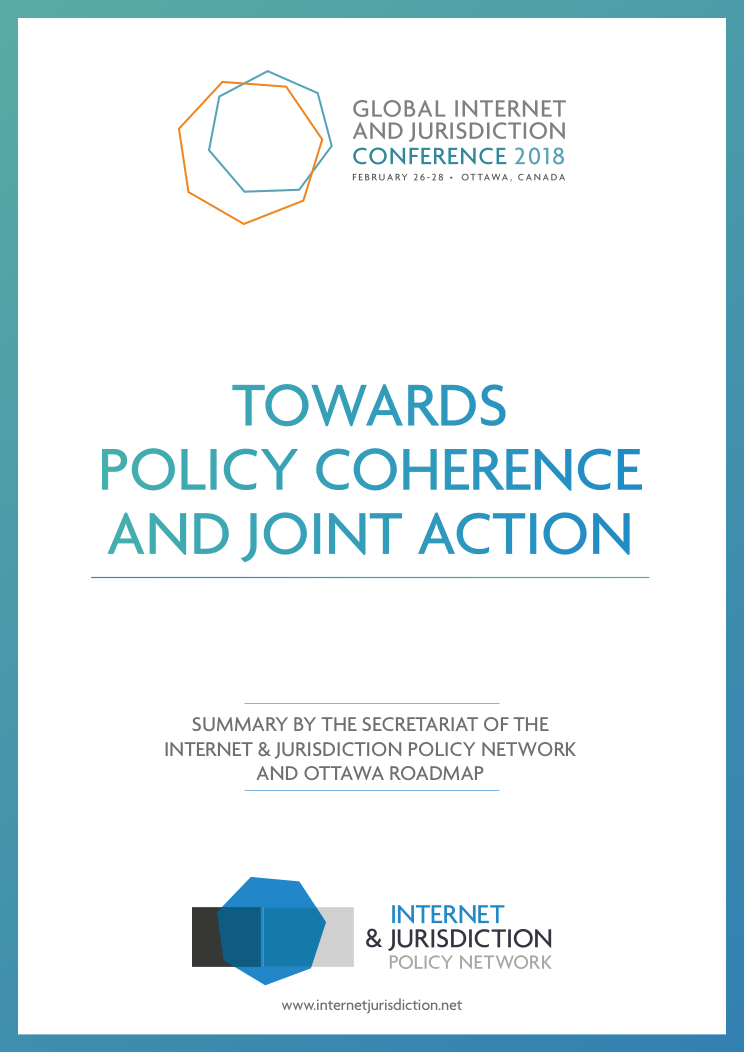The 2nd Global Conference of the Internet & Jurisdiction Policy Network on February 24-26, 2018 in Ottawa, Canada, was a significant milestone in advancing the development of operational solutions and policy standards in order to reduce jurisdictional tensions in cyberspace.
The Ottawa Roadmap that came out of the gathering of over 200 senior level representatives from governments, the world’s largest Internet companies, technical operators, civil society groups, leading universities and international organizations constitutes a significant achievement of the Policy Network and the multistakeholder model. Among others, it was explicitly highlighted by the G7 Cyber Group, which expressed its support for the “continued multistakeholder work under the auspices of the Internet & Jurisdiction Policy Network” in its 2018 Chair Report.
The 2nd Global Conference was organized in partnership with the Government of Canada and institutionally supported by the OECD, Council of Europe, UNESCO, European Commission and ICANN. It received major international attention and found coverage in top tier outlets including The Financial Times, Politico, and The Washington Post.
After Ottawa, the Secretariat of the Policy Network undertook intensive international outreach efforts to promote the results and engage stakeholders in the work of the multistakeholder organization. The Secretariat was invited to present the outcomes of the 2nd Global Conference to the Member States of the OECD in its Digital Economic Policy Committee in Paris, and co-organized a workshop with the African Union Commission for African ambassadors and other stakeholders in Addis Ababa. The Secretariat participated in the G20 B20 Digital Economy Summit upon the invitation of Argentina, being in the presidency of the G20.

In Brussels, the Secretariat organized a workshop with all relevant DGs of the European Commission to discuss the Ottawa Roadmap, and was invited to present outcomes at the EU High-Level Meeting of Internet Governance representatives of the 28 Member States. In Georgia, the Secretariat discussed outcomes with European stakeholders at the regional Internet Governance Forum EuroDIG.
Engaging Latin American stakeholders was another priority. Colombia and the UN Economic Commission ECLAC invited the Secretariat to the Ministerial Meeting on the Information Society in Latin America and the Caribbean to promote the Ottawa Roadmap in Cartagena. Moreover, the Secretariat participated in the regional Internet Governance Forum LACIGF in Buenos Aires. RightsCon in Toronto allowed the Secretariat to discuss with a wide range of civil society actors in a dedicated session the Ottawa Roadmap and receive important input. UNODC invited the Secretariat to a workshop in Vienna. In North America, the Secretariat moreover participated in a dedicated session at the USA IGF.
The Ottawa Roadmap and its Work Plans for cross-border access to e-evidence, content restrictions and domains suspensions help to structure international reform discussions and draw attention to some of the greatest challenges at the intersection of the economy, human rights and security in the digital 21st century.
Implementing the mandate coming out of the 2nd Global Conference, the Secretariat also initiates the intersessional policy development work. Three multistakeholder Contact Groups for the Data, Content and Domains Programs will be tasked with developing concrete proposals for operational solutions and policy standards based on the Work Plans adopted in Ottawa. Their members and more details will be announced in September 2018. The result of their work will, after a period of stakeholder deliberations, serve as the basis for discussions at the 3rd Global Conference of the Internet & Jurisdiction Policy Network, which takes place on June 3-5, 2019 in Berlin and is organized in partnership with the Government of Germany.



